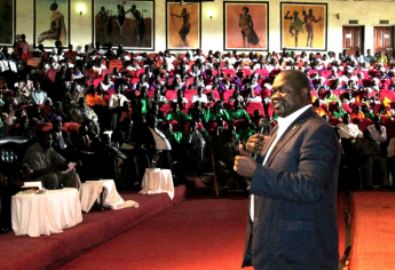Machar’s Sunday prayer in ethnic Dinka church attracts controversy
May 22, 2016 (JUBA) – A decision by the South Sudan’s newly appointed First Vice President, Riek Machar, to attend prayers at a predominantly ethnic Dinka church on Sunday has attracted criticisms from his opponents, but praised by his official as a step toward in reconciliation process among the people of the war-ravaged nation.

The membership of the ethnic Dinka church is however predominantly of the Greater Dinka Bor community of the Dinka ethnic group from Jonglei state.
Speaking as the special guest invited by the church leadership, Machar told the audience that peace and reconciliation will enable national healing and ensure stability, urging the people to forget about the bitter past that had happened beginning with the massacre of thousands of members of the Nuer community in Juba and should instead move forward with forgiveness and reconciliation.
He did not apologize for the war but held government forces under the leadership of President Salva Kiir responsible for triggering the war on 15 December 2013 in Juba when the Presidential Guards of Tiger Division fought among themselves, and President Kiir was also seen on 16 December on the national TV with the Tiger military attire as massacres of civilians ensued in the capital.
Machar, who has become more powerful than during his previous position as Vice President before the 2013 crisis, said despite resisting the former government for two years the peace agreement has brought them together and formed a new coalition government.
“I and those who joined me resisted the government. Now we are in a transitional government of national unity and determined to move forward peacefully,” he said, speaking in Arabic.
But not everyone welcomed him at the church or his message. Several church goers were seen marching out of the church in protest.
“It is unfortunate that a place of worship is being turned into political platform,” wrote social media user under the name John Dhieu.
Other members of the church posted photos of Machar in the church with critical comments – questioning the judgment of the church leaders when inviting politicians to talk politics in the church.
Machar’s press secretary, James Gatdet Dak, when contacted said there was nothing wrong in passing the message of peace and reconciliation by a politician in the church, arguing that members of the church are citizens and leaders of South Sudan who should be playing role in peace making and reconciliation and should therefore be enlightened on the topic.
“The Bible says “Blessed are peace makers” whether a politician or non-politician. These include peace makers within the church membership and they cannot become peace makers without talking about peace and reconciliation inside the church,” James Gatdet Dak told Sudan Tribune on Sunday.
Dak also reminded that the chairperson of peace and reconciliation body in South Sudan, Archbishop of the Episcopal Church, Daniel Deng Bul, is a top church leader, adding the church has the responsibility of using its services as a platform for spreading the message of peace and reconciliation.
The visit to Emmanuel Jieng Parish Sunday was the fourth that Machar since his return to Juba had been going to different church denominations in the capital for the past four weeks, preaching the word of peace and reconciliation.
Last week, he was at the All Saints Cathedral church at Mobil Arabic service spreading the message of reconciliation and healing in South Sudan, where he was welcomed by the church leadership and members.
However, it seems some members of the Emmanuel Jieng [Dinka] Parish have not been tolerant in facing political opponents in the church.
In December 2015, Rebecca Nyadeng de Mabior, the wife of late SPLM leader, John Garang, was assaulted by angry Christian during the church service, accusing her of playing a role in a war that led to killing of worshippers in Bor church.
Seventeen people, including fourteen women, were killed in Lieudiet Church, the headquarters of Episcopal Church of Sudan, Bor diocese in Bor in January 2014. Their remains were buried in a mass grave at the church compound.
Though the 21 months of war took ethnic dimension, several politicians from Dinka Bor, including Mabior Garang de Mabior and one Alier Ateny joined Machar’s side. Mabior, eldest son of late leader, John Garang, was appointed a national minister by Machar and Alier as a governor for Jonglei state, as proposed by Machar in 21 provinces he divided the country into.
Emmanuel Jieng Church declined several attempts to comment on the controversy created by Machar’s visit to the church on Sunday.
(ST)
